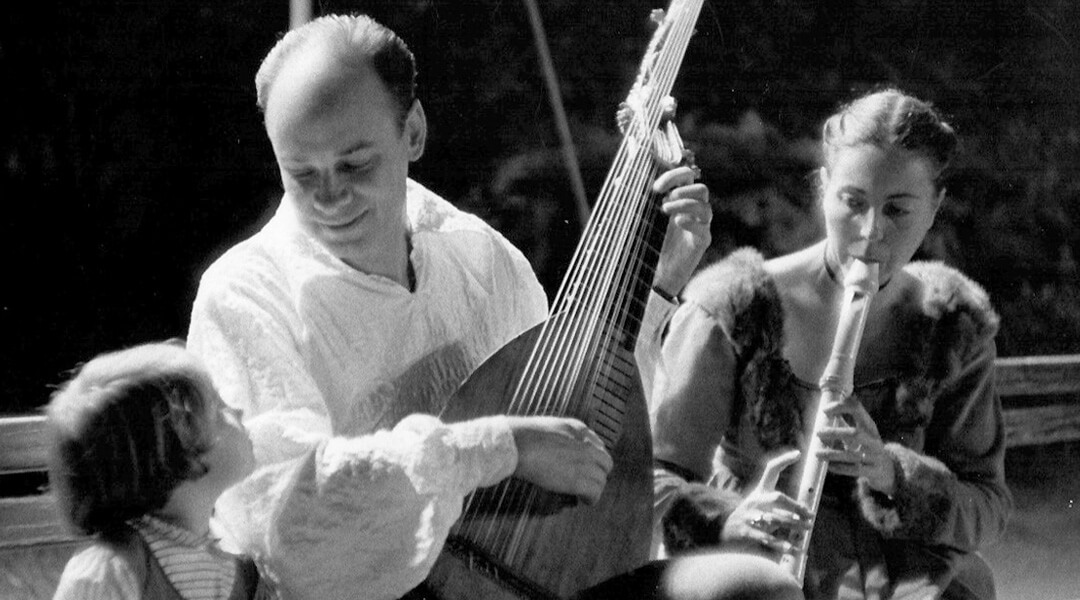You help preserve family and community history! Because of you, the Library is able to connect families with long-forgotten memories.
“My parents twice started me on the piano, and I had a very bad teacher, one who never got me close to a piano. I sat at a table and lifted my fingers on a chart that had a drawing of the keyboard, so I gave up. When I was in high school and wanted to play an instrument, my parents were leery and didn’t want to buy a piano for me, but they invested a dollar in a fife. So, I became a fifer, and that was my first instrument.”
These words are from a recording made in 1992, part of the Maurice Levy Oral History of Music in Pittsburgh Project (OHMP). The voice of the late Colin Sterne pauses, then he laughs warmly at the irony of it all. During his life, Colin obtained a master’s degree in composition from The Julliard School and studied at the Paris Conservatory. Professionally, he was a flutist for the Pasadena Civic Orchestra and director of music for WQED from 1954-1955. Additionally, Colin was a composer, performer, and beloved professor of music at the University of Pittsburgh for 38 years until his retirement in 1986. He founded and was a conductor of the Ars Antiqua Players, as well as the founder of the Renaissance & Baroque Society. Colin was a card-carrying member of the American Musicological Society, the American Recorder Society and the Phi Mu Alpha music fraternity. People called him prolific, influential, a pioneer and a genius, and it all started with a fife that cost a dollar.
“I didn’t know at the time that he had been interviewed for the OHMP,” says his daughter Robin Sterne. This was the pet project of Maurice Levy who began volunteering at Carnegie Library of Pittsburgh’s music department in 1990. Inspired by a passion for music, Maurice spent the next 15 years hitting the record button and collecting oral histories of 300 Pittsburgh musicians, everyone from “Daddio of the Raddio” Porky Chedwick to the president of the Pittsburgh Banjo Club. Robin’s father, Colin Sterne, was interview #33. She had been hunting for old television recordings of her father when she discovered it.
“Unfortunately, with one exception, none of (the videos) existed anymore,” she says. “They had all been saved on tape, which had long ago disintegrated, and the only surviving video, from the 1970s, was one of my parents playing music. However, in the process of trying to track down those videos, I did some research and came across an article published in August of 1994 that mentioned my father’s name in connection with recorded interviews made for the OHMP that was being compiled by Carnegie Library.”
In October 2022, Robin and her sister Hilary Sterne returned to Pittsburgh to bury their parents’ ashes following the death of their mother, Roberta. “We decided to walk over to the Library to see if (the recording) might still be there,” she says. “I fully expected to be told that the Library didn’t have it anymore, but we were thrilled to discover that it was still there!”
Thanks to you, Carnegie Library of Pittsburgh is able to preserve and house these important collections and others like them.
The interview consists of three recordings: 31 minutes, 29 minutes and 21 minutes. Colin’s voice is smooth and approachable, welcoming and unpretentious as he dives into 50 years worth of memories, his genuine laugh cascading from the speakers.
“It brought him back to me so vividly,” says Hilary. “He died of Alzheimer’s in 2008 and had been unable to communicate for several years before that, which was devastating for us. He had been a very witty and charming storyteller, a raconteur. He knew how to hold an audience rapt. I can’t count the number of times I’d be out with him when someone would approach to tell him they’d taken his class years ago and how much they’d enjoyed it.”
The stories he tells are vivid, energetic and joyful, referencing Aaron Copeland, Robert Frost and Leonard Bernstein as well as WQED as contemporary music found a home in Pittsburgh during the 1950s.
“It was like he was in the room with us,” says Robin. “The folks at the Library were so helpful to us when we went that day looking for the recorded interview. They not only found it for us, they set us up with a dual headset arrangement so we could both listen to it at the same time. When I asked if I could get a copy of the interview, the Library staff was very accommodating. It’s so wonderful to be able to hear my father’s voice again! And I learned a few things from the interview that I never knew about my father.”
The Library looks forward to professionally digitizing all 300 OHMP interviews with support from the Friends of the Music Library. The long-term goal is to make them available so patrons can stream them at any time from anywhere. In the meantime, all of the interviews are available for listening on the second floor of the Main Library. Visit carnegielibrary.org for a complete list of people interviewed.
“Hearing the past in the voices of those who lived it brings history to life,” says Hilary. “It’s an amazing way to preserve and share not just the past but what it is that makes us human.”
Through your generosity, the Library is able to capture and preserve community history for future generations.

